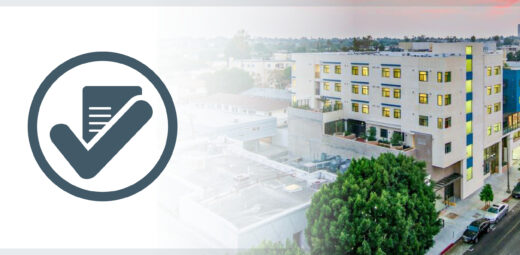
Feb 27Policy Update for Los Angeles: Measure ULA
Generating New Funds for Affordable Housing and Homelessness Prevention
Housing was very much on the ballot in 2022, with thousands of Californians voting on local measures representing different approaches to tackling the housing crisis. The policies that prevailed last November are now shaping the way cities plan, fund, build, lease, and preserve affordable housing. Mercy Housing California (MHC) is taking a closer look at a few of the policies and proposals with the power to make a big difference in addressing our affordable housing shortage.
In Los Angeles, voters ushered in Measure ULA (short for “United to House LA”), authorizing a new funding source for affordable housing development and homelessness prevention programs. According to a report from UCLA, this new policy could generate around $900 million every year by increasing the taxes owed on each real estate deal over $5 million – or an estimated 4% of annual LA real estate transactions. The revenue earned from Measure ULA is estimated to fund the production of around 26,000 affordable homes over the next ten years, as well as provide support for renters such as cash assistance.
While most of the funds generated will be geared towards affordable housing production, the 30% of funds earmarked for homelessness prevention activities distinguish Measure ULA from other LA housing funding programs and will play a key role in stabilizing the families, seniors, and individuals at risk of losing their housing. According to the housing justice organization and MHC partner All Home, jurisdictions trying to reduce homelessness must simultaneously invest in interim housing, permanent supportive housing, and homelessness prevention.
In fact, the Los Angeles Homeless Services Authority announced that, while an average of 207 people experiencing homelessness were moved into housing each day of the year 2020, an additional 227 people became homeless every day, meaning individuals losing their homes outpaced successful efforts to rehouse people. Adding new affordable homes – not just permanent supportive homes for people who are already experiencing homelessness – is one important way to address this issue.
While almost 58% of voters supported the measure, not everyone agrees that it is the right path forward to address Los Angeles’ housing and homelessness challenges. A coalition of real estate and homeowner groups have brought a lawsuit against Measure ULA, hoping to prove that California’s Proposition 13 makes “transfer taxes” for specific, designated purposes unconstitutional. LA officials say they are confident that the state constitution allows for citizens to initiate this kind of tax via ballot initiative, and the City still plans to begin collecting the tax on April 1. However, the revenue may be held in an escrow account until the lawsuit is resolved.
In another challenge to Measure ULA, a different real estate group has collected enough signatures to put an opposing proposition on the 2024 ballot that would invalidate any special tax increases passed between 2022 and 2024 with less than a two-thirds majority. Many of those who wish to overturn Measure ULA say it places an unfair burden on homeowners, and that the increased tax on property sales will lead to higher rents.
While Measure ULA’s future remains uncertain, newly elected Los Angeles Mayor Karen Bass has already declared a “State of Emergency” on homelessness and is beginning to roll out ambitious proposals to support people experiencing housing insecurity. Many of these plans would be greatly aided by the revenue from Measure ULA.
No related posts.
Stay Up To Date
Get news on Mercy Housing and inspiring stories of change delivered to your inbox.


